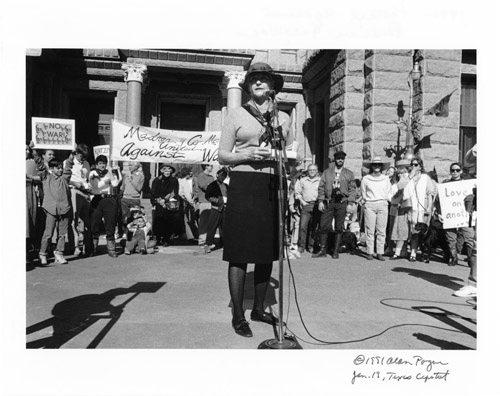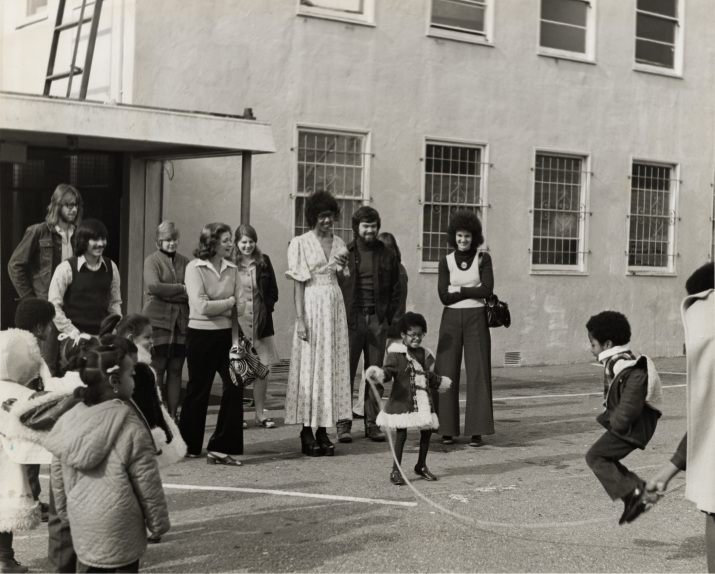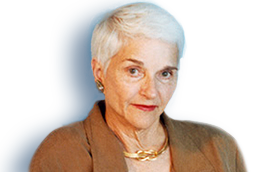-
Frances “Sissy” Farenthold with President Jimmy Carter at the Rothko Chapel’s Carter-Menil Human Rights Awards, 1991
-
Frances “Sissy” Farenthold with Ericka Huggins at a Black Panther Party Gathering
-
Farenthold at a 1991 Persian Gulf War Protest
-
Frances “Sissy” Farenthold with Joseph McFadden and Nelson Mandela at the Rothko Chapel’s Carter-Menil Human Rights Awards, 1991
Human Rights Activism
Sissy Farenthold pursued nearly all of her international human rights work from her home base in Houston. Though she was often traveling, she was also keenly aware of the ways in which Houston is a global city, and she has long pursued much of her activism there.
The Rothko Chapel, for which Farenthold served as chair of the board, was the most obvious place for her global human rights work. During her tenure, Charles Moyer, the first Secretary of the Inter-American Court for Human Rights, and Joe Eldridge, the co-founder and first director of the Washington Office on Latin America, joined the board of the Rothko Chapel. Along with Farenthold, they helped the chapel maintain its presence as a human rights organization.
In 1991, the Rothko Chapel Human Rights Award conference featured Nelson Mandela and former President Jimmy Carter. After Mandela’s death in 2013, Farenthold was asked to deliver reflections on her friend at the Rothko Chapel’s memorial service for the human rights icon. The honor was fitting given her work in the anti-apartheid movement in Houston.

Perhaps the height of that activism came in February 1985 when she and her cousin Genevieve Vaughan were arrested at the South African Consulate in Houston for criminal trespassing. Recruited by African-American activists in Houston’s Free South Africa movement, Farenthold and Vaughan talked their way into a meeting with the consul. As protesters organized outside the building, Farenthold and Vaughan denounced apartheid, and then refused to leave the consulate.
Ada Edwards, a leader of Houston’s anti-apartheid movement, was among the activists who recruited Farenthold to go to the consulate. The group had been staging a series of actions at the consulate that required people to be arrested. Edwards was looking for someone who wasn’t clamoring to be in the spotlight, but who had broad appeal and credibility.
“We need a white woman, somebody with some standing, somebody who will not act a fool when they get arrested because we don’t have any money to bail her out of some real problems,” Edwards said. “And they said, ‘This woman is Sissy Farenthold.’”
Randall Robinson, the leader of TransAfrica, which played a leading role in the anti-apartheid movement in the 1980s and early 1990s, wanted “Houston to become the Birmingham of the apartheid movement,” Edwards said. As a global city, Houston had the connections with many of the international businesses that operated in South Africa. Shell Oil was a target of Houston protestors, in addition to other businesses and the consulate.
Even then, Farenthold’s support for human rights included all oppressed groups, from gay people to Central American refugees to workers.

In the late 1970s, while still living in the state of New York, Farenthold became an active voice in the gay rights movement. Farenthold addressed over 3,000 gay rights activists at a meeting in Houston on June 25, 1978 endorsed by the Gay Political Caucus. In her address, she linked support for gay rights with her status as a straight white woman with four grown children. “No one is free unless we are all free,” she said. Farenthold compared the gay rights’ movement to the women’s movement and encouraged further solidarity and organization of oppressed groups.
Three years later, on June 28, 1981, Farenthold addressed a third meeting endorsed by the Gay Political Caucus. She said, “Political control of sexuality does violence to fundamental human rights.” And she characterized gay pride as “an affirmation of personal worth … because sexual orientation is irrelevant to the living space and freedom due each individual.”
Her support for these fundamental human rights extends to refugees fleeing violence in Central America. In 1986, Farenthold and religious leaders in the state founded El Refugio del Rio Grande, a haven for Central American refugees near Harlingen on the Texas-Mexico border. Farenthold used her considerable connections to help educate Americans about the human rights crisis in the country, where death squads killed political dissidents with impunity.
“She knows some of the most powerful people in the United States,” said Francisco Lopez, who fled El Salvador in 1985 and moved to Houston. “Also, she knows very well known people around the world … but she never lost touch with the grassroots.”
As a longtime opponent of the death penalty, Farenthold also lent her voice to the movement to abolish it.
“She will do these things that are very, down-to-earth, local actions, but then maybe next week she’ll be in Europe or she’ll be in some other part of the world, you know, working on more of an international issue. And that gives her a lot of credibility and a lot of power when she speaks,” said David Atwood , a founder of the Texas Coalition to Abolish the Death Penalty and a member of Pax Christi, a Catholic peace group.
Atwood began working to end the death penalty in the 1990s. At the time, Texas led the nation in the number of executions. He said most politicians, even progressives, avoided opposing the death penalty in those days. Farenthold was an exception; she used her influence to get elected officials, current and former, to support anti-death penalty activities.
Based on her strong belief in restorative justice, Farenthold also visited death row inmate David Lee Powell for over 20 years before his execution in 2010. Powell was sentenced to death for killing a police officer during a traffic stop in Austin, Texas. Before Powell’s execution she wrote in an op-ed in the Austin American-Statesman, “Restorative justice promotes respect for human life with the conviction that no one is irredeemable.”1
Farenthold continued to work on behalf of “the grassroots,” as Lopez said. In 2012, she supported a janitors’ strike for higher wages in Houston. Many of the workers engaged in the strike were immigrants from Mexico and Central America. And when Occupy Wall Street spread to Houston, Farenthold was among the supporters of the national initiative to bring attention to income inequality and what was considered undue influence of corporations on government.
Her speech to an Occupy rally in Houston on October 6, 2011 captures her commitment to and belief in social justice. Holding a bright red megaphone, she told the crowd: “We are no longer dormant. We are taking matters into our hands with the Constitution and the right to assemble. It’s just the beginning.”2
1 Op-ed. http://www.statesman.com/news/news/opinion/farenthold-should-we-kill-david-lee-powell/nRtb9/
2 Occupy Wall Street Rally. https://www.youtube.com/watch?v=briIBIm72T0


